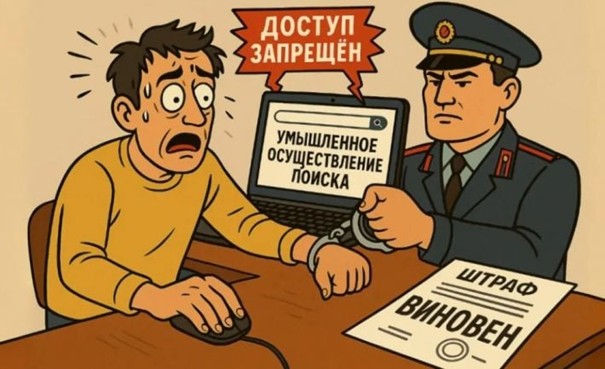
Russia’s latest legislative crackdown on freedom of information came into force on 1 September, less than two months after the amendments were first slipped into a bill purportedly about something else altogether. As RIA-South points out, the move is particularly worrying for people in occupied territory, where Russia has systematically blocked free information, and effectively all Ukrainian sites, with people heavily relying upon VPNs to bypass such restrictions.
As reported, the bill, passed by the State Duma on 17 July 2025 and swiftly signed into law by Russian leader Vladimir Putin, is the first time that Russia has banned Internet searches. Such bans are, purportedly, only of ‘knowingly extremist material’, with penalties applied only if this was a ‘deliberate search’. The first problem is, of course, the lack of any clarity as to what constitutes ‘extremist material’, especially with respect to occupied parts of Ukraine, where essentially anything linked with Ukrainian culture, history and / or identity can end up labelled. Such woolly terminology is quite deliberate. The fluid interpretation and ever-growing list of banned material instil terror and make it much more likely that people will engage in self-censorship, avoiding sites ‘just in case’. The fact that the ‘deliberate’ nature of a person’s search needs, in theory, to be proven would, in normal circumstances, make prosecution less likely. On occupied territory, the opposite is more likely to be the case, with occupation enforcement bodies interpreting intentionality as they please.
Two new articles have been added to Russia’s code of administrative offences which is illegally applied in occupied Ukraine. Article 13.52 imposes liability for infringing the rules for the use of VPNs in the Russian Federation or on illegally occupied Ukrainian territory. The fines here are potentially steep – from 50 thousand to 200 thousand roubles for an individual; from 80 to 300 thousand in the case of an official; and from 200 thousand to a million in the case of a legal entity.
Article 13.53 imposes liability for what is called “searches for knowingly extremist material”, as well as for gaining access to these, including through the use of VPNs or other means of accessing resources where access has been restricted. The fines are very small for an individual, however the very fact of such a ban will surely make it much easer to persecute Ukrainians using VPN’s, especially since these are typically used to access banned Ukrainian sites.
There are constant reports of school students having their mobile phones standard checked, and essentially anybody can be stopped on the street, with the telephone’s history immediately ‘incriminating’ the person.
This is not the only method Russia can use to implement its bans and instil fear in the population. Internet providers have already been forced to ‘cooperate’ with Russia’s security service [FSB] and other enforcement bodies by gathering and passing on information about Internet searches.
The current regime under Vladimir Putin set about reinstating Soviet style encouragement of ‘denunciations’ many years ago, with these latest legislative initiatives also inciting people to ‘tell on others’. This will only heighten the atmosphere of terror on occupied territory, while also placing people at risk from a neighbour or colleague with an axe to grind, or who are hoping for some kind of benefits for ‘exposing’ a person for accessing Ukrainian sites. RIA-South reports that experts fear that the apparent safeguards such as the insistence on a search being ‘deliberate’ will mean nothing, and that any screenshot or denunciation by a ‘concerned neighbour’ will lead to a person’s prosecution. The publication stresses that it will be for the Internet user to prove that they did not search for prohibited material deliberately, rather than being up to them to prove that it was intentional.
As well as scope for scams, the legislation will make it easy to blackmail people by, for example, sending them a link to a banned site and then recording the person clicking on the link and opening the prohibited site. With Russia’s ‘justice system’ having been systematically destroyed and increasingly used for political persecution, there would be no grounds for expecting a court to try to establish the truth, or for a person subject to such blackmail attempts to believe that the court would issue a fair judgement.



